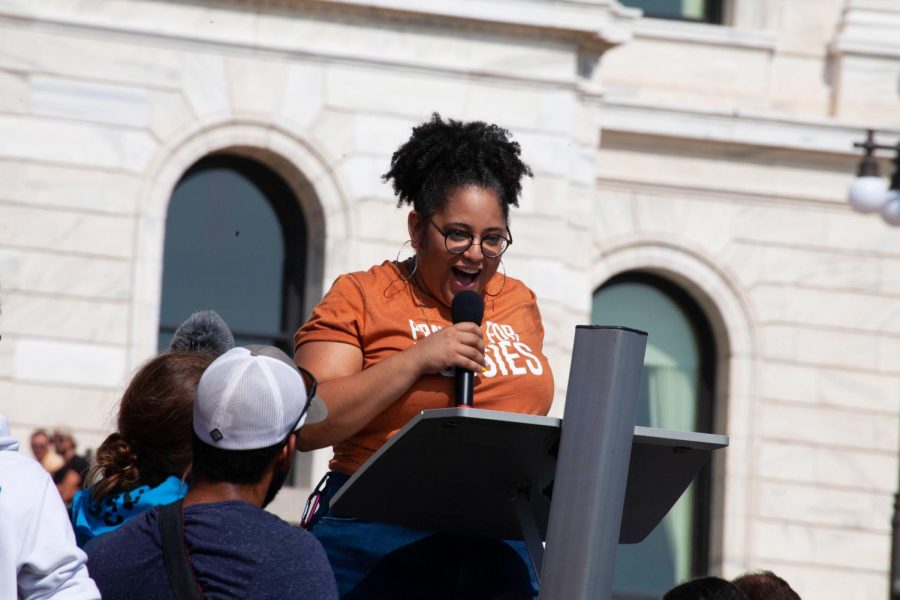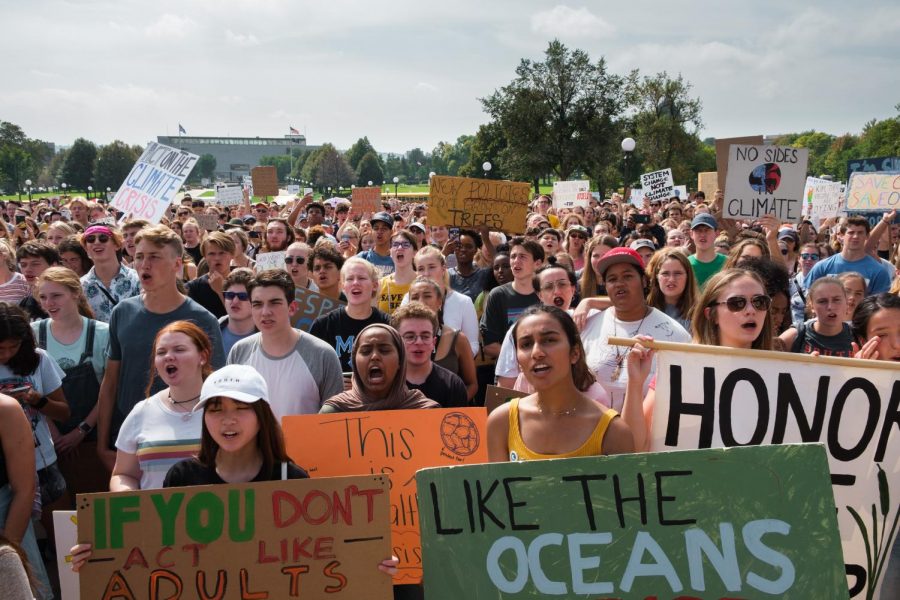Activists target capitalism, racism and colonialism in climate fight
September 26, 2019
On Friday, Sept. 20, thousands of Minnesotans gathered at the state capitol in St. Paul to take part in a four million person strong international climate strike.
Throughout the morning, Macalester students, faculty and staff arrived at the capitol in waves — on buses and trains, on bicycles, with signs and pins and literature — and the message they heard there was clear: serious action on the climate requires a total re-evaluation of the way we live.
“I thought Elizabeth Warren summed it up well,” geography professor Bill Moseley, who attended the strike, said. “There was a recent Democratic debate on climate issues, and she poked fun at this sort of obsession with recycling and plastic straws — saying that we have to think about deeper structural issues.
“Most critical social scientists have been there for a long time.”
The speakers at the capitol on Friday, who were almost exclusively students and other young people, were there as well. They focused on major structural issues: the global economic system, racism and colonialism.
“When we’re talking about environmentalism, we always think about nature,” COPAL environmental justice officer Marco Hernandez ’19, who spoke at the strike, said. “But… in order for us to successfully combat this climate crisis, we need to look into ourselves deeply — culturally, socially, economically and politically.”
Extractive capitalist economics were singled out in particular — both as the primary cause of the current climate crisis, and, in Hernandez’s words, the “biggest obstacle” to solving it.
“Rising CO2 levels in the atmosphere tie directly into the industrial revolution,” Moseley said, “The continuing evolution of the capitalist economy and a long history of colonialism.
“The global north has largely benefitted from the culling of resources from all over the world,” he continued, “I think we’ve been extremely reluctant to address climate change because somehow that might mean reigning in capitalism and living within the biophysical limits of the planet.”
But with a handful of major companies emitting the vast majority of the planet’s greenhouse gas, several speakers, including Hernandez, called Friday for the U.S. to do exactly that.
“The time is now to relocalize most of the production and consumption of goods,” Hernandez said at the strike. “We cannot continue the globalized economy.”
But Friday’s event was not focused on capitalism writ large. Rather, there were explicit attempts to highlight systems of oppression that climate change has exacerbated.
“Climate change and capitalism have created economic refugees in Latin America and around the world,” he said during his speech. “They are met with a white supremacist society that discriminates against them.”
Those migrants are the ones who have the ability to move at all — something that many people in various parts of the world cannot do.
“We don’t think of migrants as wealthy people, but it takes a lot of resources to successfully migrate from one place to another,” Moseley said. “What we don’t hear about are all the extremely poor people who never even leave those places.”
Those people, Moseley said, are trapped as the climate changes around them through no fault of their own.
“It’s the poorest members of our societies and societies in other parts of the world that are most vulnerable to the changing environment,” he said. “They’re the ones who are going to feel the impacts the most.
“It’s white privilege and racism that allows us — and by us I mean the dominant white society — to think of ourselves first and not consider the impacts,” he continued.
At the conclusion of the speaking program, a number of the remaining crowd moved inside the capitol building for a die-in.
During the improteu rally that followed, the Twin Cities chapter of the Democratic Socialists of America, which distributed literature from a table at the event, draped a banner reading “ecosocialism or ecoapartheid” over a balcony.
Avik Herur-Raman ’20, who is a member of the chapter’s ecosocialism branch, said that the phrasing “ecoapartheid” was deeply intentional — the result of a protracted discussion among the branch’s members.
“It was a debate, because there were voices in DSA saying [it should read] ‘extinction,’” Herur-Raman said. “But other voices — and those voices ultimately swayed the rest of us — said, ‘we need to be clear about what’s at stake.’”
“If we delude ourselves into saying this is actually some struggle where everyone is at the same risk, we’ll forget about those who are already the most vulnerable,” he continued. “The brunt of climate change will not be borne by everyone equally. That’s so obvious now.”
Indeed, a number of the speakers at Friday’s strike came with firsthand knowledge of what happens when the forces of environmental decline, racism and neoliberalism intersect.
Some got their start in environmental organizing opposing the Dakota Access Pipeline at Standing Rock. Others are actively engaged in the fight against Enbridge’s Line 3, an oil pipeline slated for construction on protected Native land in northern Minnesota.
Hernandez, who grew up in Richmond, California, a majority non-white Bay Area city northwest of Berkeley, has his own story to tell.
Richmond is home to the second largest oil refinery in California — a 2,900-acre behemoth that processes nearly 250,000 barrels of crude oil each day for Chevron. It is the city’s largest employer, and has been for decades.
As a result, its place in Richmond’s landscape and psyche is immense.
“From anywhere in that city, you can see the refinery,” Hernandez said. “Growing up, we thought that was the place clouds were made because there was always white smoke coming out of the smoke stacks.
“But then, one day, it explode[d].”
In the aftermath of that 2012 fire, which left some 15,000 people in the area seeking treatment for various ailments and concerns, Hernandez was shaken. Watching news coverage of the incident, he came to a realization.
“The faces that I would see on TV were always black and brown faces. Rarely any white faces… The refinery affected all those people in Richmond. These wider communities,” he said, referring to other Bay Area cities, “were not affected.
“I was like, ‘huh,’” he continued. “We have this refinery, and it’s mostly black [people] and Mexican immigrants who are living in these spaces, breathing this air.”
Isra Hirsi, the 16-year-old daughter of Rep. Ilhan Omar (D-MN) and co-founder of the U.S. Youth Climate Strike, one of the organizations responsible for leading Friday’s action, made a similar point in her speech.
“I’ve heard something funny has been going around about the fossil fuel industry saying they’re tired of hearing about this crisis,” she said. “Well, we’re tired too. Because it’s always been indigenous, black and brown people putting their bodies on the line.”
Moseley said that this increasingly comprehensive view of climate change is becoming “more mainstream,” and Herur-Raman agreed — comparing Friday’s strike favorably to the “March for Science” that brought in excess of 10,000 people to the state capitol two years ago.
“Science doesn’t mean one thing or another,” Herur-Raman said. “Science can be used for terrible things. We know that. The Nazis liked science to some degree. Exxon — they all employ scientists. And they can be twisted by the profit motive.
“[Friday’s action] was the exact opposite,” he continued. “Justice. The language of labor: Strike. Struggle. Solidarity.”
Along the same lines, Hernandez, in his speech, quoted and paid homage to Berta Cáceres — a Honduran environmental and indigenous rights activist who was murdered in her hometown of La Esperanza in 2016.
Cáceres’ assassination has been traced many times over to members of the Honduran military, as well as to business interests she opposed. As of last year, the Honduran government indefinitely suspended the murder trial of the eight men accused of killing her.
“Even though she knew she was being targeted, she always believed in agrarian land reform, believed in the human right[s] of clean air [and] clean water, and [believed in] working against huge corporations — especially American corporations — that promote neoliberal policies so that they can get more profit off of the land and natural resources.
“This organizing got her killed,” he continued. “It got a lot of her supporters killed as well. But that hasn’t stopped the movement.”
Cáceres’ defiance might serve as inspiration as people take up these fights in the weeks, months, and years ahead.
“We aren’t Generation Z,” Hirsi said. “We aren’t the last to live. And we won’t let this crisis be.”
For coverage of Macalester’s involvement in the climate strike, see here.
Climate strike photo story is below. Photos by Kori Suzuki ’21 and Malcolm Cooke ’21.













